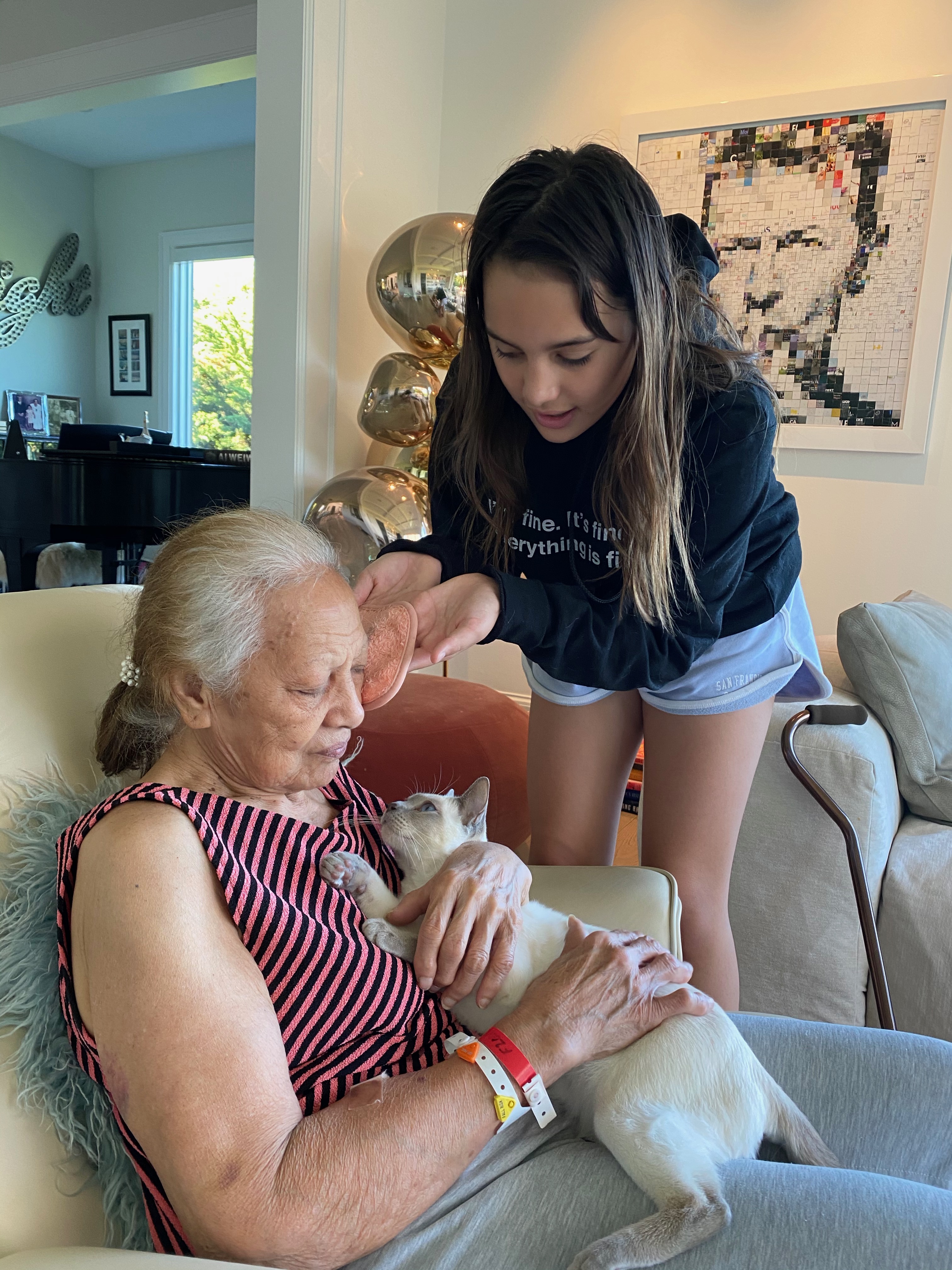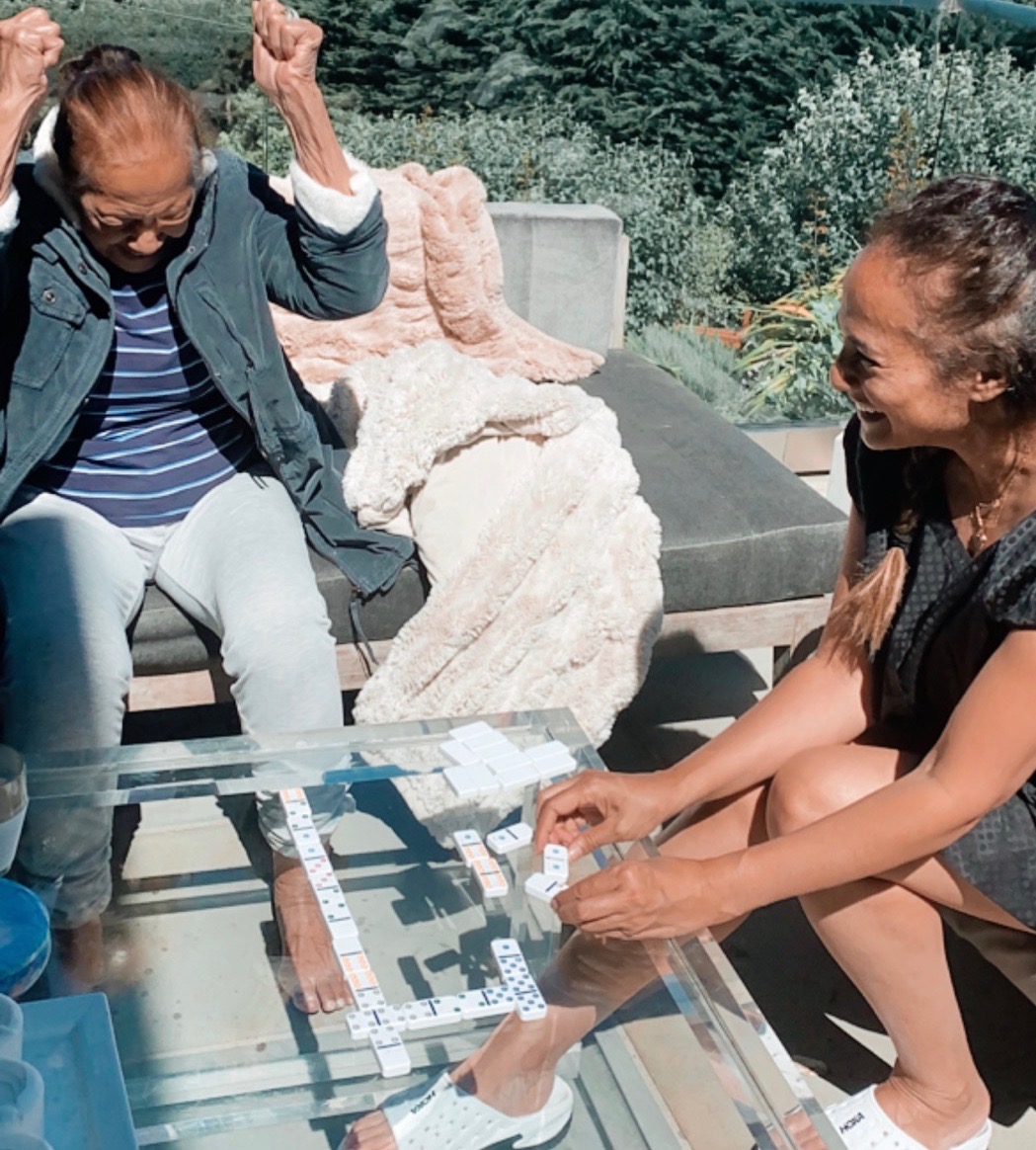My mother is 82 and has lived with our family for the past decade after a fluke trip to the emergency room (tennis, sprained thumb) uncovered alarming hypertension. She was visiting from Samoa where she and my father had retired. She hadn’t seen a doctor in years. A follow-up comprehensive visit showed her brain covered in degenerating plaque and tangles. Diagnostic reports predicted that …

By 2020 she would lose 70% of her cognitive functioning.
To prepare for the onset of Alzheimer’s and other risks, her doctors suggested we get her on new meds, change her diet, and keep a close eye on her. This was difficult because my parents moved away from the Bay Area where I was raised, a place with the best healthcare facilities in the world—to a remote country in the middle of the South Pacific with one main hospital, several dozen doctors, and no independent drug regulatory authority. My father, selfishly enjoying island life, refused to move back to California to safeguard my mother’s health. I had premonitions of her suffering a stroke amid the papaya trees without him even noticing. I begged my mom to live with us. She was reluctant, not wanting to intrude on my introverted husband and our new family. But, it was Dave’s appeal that persuaded her to stay—we were not only taking care of her, she was also taking care of us.
She was in her seventies back then and superhuman-strong, something she attributed to her Samoan roots. She resisted our pleas to stop hauling suitcases up two flights of stairs whenever we’d return from a trip. Or to refrain from rearranging heavy furniture to make space for games. The kids loved having another playmate. She’d entertain them for hours while we tapped away on our laptops scrambling to get work done. She was an energetic member of our household, up for anything. She’d play basketball in the rain with my son, help get our baby daughter ready for bed, and join my monthly women’s dinners. One night a suffering friend, raw from her husband’s affair, agonized aloud at the thought of divorce. We tried to soothe her with diplomatic advice even though we thought her husband was a douche. Suddenly my mom piped up and everyone turned to listen, “Men don’t change,” she declared solemnly, “You need to leave him.” In addition to doling out wisdom, she helped with every aspect of our lives from obsessively cleaning our house to caring for our children and everything in between. She could walk three blocks to the grocery store or meet a friend for coffee at our local Starbucks.
She was adept at navigating city life. Today, walking out our front door alone is unthinkable.
Her decline was gradual. It wasn’t dramatic as I’ve seen with other friends’ parents. I didn’t tune into it until we moved to the suburbs. It started with her retreating from social dinners at home, and then not wanting to go to restaurants, and finally staying close to her bedroom. During this time Amy and I had just started The What. I was writing, designing, panicking—engaged in all the self-important busy-ness required to get our business off the ground. We’d host work events at the house and everyone fawned over my mom. She was a constant fixture, smiling sweetly while cleaning around us. I didn’t realize that she didn’t say much because she could no longer keep up with our conversations. Her forgetfulness started to expand beyond leaving faucets on to include auto-pilot functions like how to read a book, use her cell phone, and sign her name effortlessly.
“You are an amazing daughter!” friends would exclaim. But I was impatient, distant, and in denial.
Sometime in 2015, when she started to retreat to her room, I began to withdraw too. I assumed she was rapt in our tête-à-têtes after the kids went to bed, but she would then interject something completely nonsensical. She was not following what I was saying. It was depressing to lose my lifelong confidante. Rather than keep trying to engage, I resorted to simple salutations, “Good morning mom! Good night mom! Have a good day mom!” I remember telling Amy how desperately I wanted to interact with her more but I couldn’t bring myself to do it. There were glimpses of her higher functioning, which gave me hope but also made her slow, foggy days seem like lapses not the onset of dementia. I naively believed if she could just concentrate a little harder, she could get better. If she took more fish oil, played more strategic brain games, ate fewer Cinnabons and more kale, she could get back to her old self. I believed I could fix her.
It wasn’t until quarantine that my whole family was confronted with how much help my mom needed.
During the first week of lockdown, my mom lost her balance and fell backwards straight as a plank—like a trust fall but with only a hardwood floor behind her. My own reflexes were not quick enough to intervene. It was the hematoma from this fall that likely led to her next health scare. A few weeks later on a leisurely afternoon I went to check on her since I hadn’t seen her in five minutes. I found her slumped over a kitchen counter unable to speak. My husband and son weren’t home. I frantically called 911 and stayed with my mom while my poor daughter snapped into action squirreling away our dogs and cats before opening gates and doors for paramedics. Turns out my mom suffered a minor stroke, which we caught instantaneously. Thankfully, she emerged from the hospital imperceptibly changed. She can still walk, talk, and eat with little help, but her neurologist made it clear—she should use a cane or walker and needs to be watched more closely. I bought a baby monitor after finding her in front of our open front door at 3am. When I asked what she was doing she said she was looking for the bathroom so I used glow in the dark tape to trace an arrow from her room to the loo. Everyone in my family has stepped up to care for her. My 11- and 14- year-olds gripe over the domestic chores they’ve inherited since quarantine like dishes, laundry, mopping, and vacuuming, but they never complain about helping their grandmother.
My kids grew up with my mom. I grew up with my mom. They have a natural acceptance of her changing state.
They don’t carry the emotional baggage I do, and I am learning from them to let go of what was and focus on what is. Yesterday, they taught her how to play dominoes, which starts by drawing 7 tiles. After each round (we played 16!) my mom repeated, “How many dominoes am I supposed to have?” And they’d gently tell her. Again. My daughter, who is normally preoccupied making TikTok videos, helps me shower my mother every night. My mom giggles gleefully as we blowdry her sparse hair then wrap her, squeaky clean, in a fluffy robe. Before bed my teenage son massages her head and feet before returning to his Call of Duty tournament. Since quarantine there’s been a lot of talk about the “new normal” but we all know that things will not go back to what it was—not here at my house or in the world for that matter. There is no more status quo. We have to reinvent new systems, a new way of looking at things, a new way of being.
There are hard times ahead, but there are also moments of joy and triumph—learning how to show up and care for each other based on what’s truly needed, not just what we feel comfortable with.

Gina Pell is the Content Chief of The What, a content + community platform that engages over 100,000 curious people.


